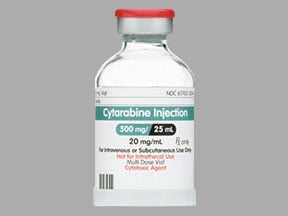
Cytarabine Coupons & Savings Card – Discount Prices from $9.23
My prescription
Edit
25ML of 20MG/ML, Cytarabine (1 Vial)
Select pharmacy

Walgreens
$9.23
COUPON PRICE
Albertsons
$17.33
COUPON PRICE
Walmart
$24.73
COUPON PRICECytarabine savings card
Show this card to your pharmacist
Walgreens
$9.23
BIN
ID
PCN
GRP
019876
LH71F75A12
CHIPPO
LHX
Powered by
Related nucleoside metabolic inhibitors prescriptions
More prescriptions for leukemia
Related nucleoside metabolic inhibitors prescriptions
More prescriptions for leukemia
Cytarabine dosage forms
Dosage Quantity Price from Per unit 25ML of 20MG/ML 1 Vial $9.23 $9.23 25ML of 20MG/ML 2 Vials $26.46 $13.23 25ML of 20MG/ML 3 Vials $43.69 $14.56
| Dosage | Quantity | Price from | Per unit |
|---|---|---|---|
| 25ML of 20MG/ML | 1 Vial | $9.23 | $9.23 |
| 25ML of 20MG/ML | 2 Vials | $26.46 | $13.23 |
| 25ML of 20MG/ML | 3 Vials | $43.69 | $14.56 |
Cytarabine Warnings
This medication can affect bone marrow function, leading to decreased levels of blood cells, including red cells, white cells, and platelets. Such effects may result in anemia, a reduced ability to combat infections, or increased susceptibility to bruising and bleeding. Notify your healthcare provider immediately if you experience symptoms like unusual tiredness, pale skin, persistent sore throat, fever, chills, or easy bruising/bleeding.
Low Blood Cell Counts: Cytarabine often causes decreased blood cell counts, which can result in fatigue, increased bleeding risk, and greater susceptibility to serious infections. Regular blood cell count monitoring by your oncologist is essential. Adjustments to your treatment may be necessary if counts are low. To minimize infection risk, practice good hygiene, avoid crowded places, and monitor your temperature. Contact your provider if your temperature reaches 100.4°F or higher.
Nervous System Issues: High doses of cytarabine may lead to nervous system complications, including loss of coordination, balance difficulties, and speech problems. These issues are rare with lower doses. Your oncology team will monitor these functions to ensure the medication remains safe for you.
Gastrointestinal Concerns: High doses of cytarabine have been linked to severe stomach problems such as ulcers and inflammation. Report any stomach pain, nausea, vomiting, or swelling to your oncologist promptly.
Ocular Complications: Cytarabine can affect the eyes, causing corneal damage and conjunctival bleeding, particularly at high doses. Preventative measures, like corticosteroid eye drops, may be recommended by your doctor.
Cardiac Issues: High doses of cytarabine may cause serious heart problems, including chest pain, cardiomyopathy, and pericarditis. Seek immediate medical attention if you experience chest pain, irregular heartbeat, or breathing difficulties.
Respiratory Problems: Serious lung issues are possible with cytarabine, especially at high doses. Report any breathing difficulties, persistent cough, or fatigue to your oncologist without delay.
Pregnancy Risks: Cytarabine might harm an unborn child, particularly during the first trimester. Inform your oncologist immediately if you become pregnant while on this medication.
Tumor Lysis Syndrome: This condition can occur when cancer cells break down rapidly during treatment, potentially leading to serious complications. Your oncology team will monitor you closely and may prescribe medications to prevent this syndrome.
Please consult your healthcare provider for further guidance and any questions regarding the use of cytarabine.
Cytarabine Side Effects
Common side effects:
- nausea
- vomiting
- diarrhea
- loss of appetite
- mouth sores
- headache
- dizziness
- temporary hair loss
Less common but important to monitor:
- liver problems
- muscle and bone pain
- chest pain
- shortness of breath
- vision changes
- difficulty swallowing
- anal sores
- kidney issues
- joint or back pain
- numbness in extremities
- unusual bleeding or bruising
Serious side effects:
- low blood cell counts
- heart or lung problems
- Cytarabine syndrome
- serious allergic reaction
Cytarabine Interactions
Interactions with high risk of serious adverse effects and should be avoided:
- Measles Virus Vaccine, Live
- Mumps Virus Vaccine, Live
- Rotavirus Vaccine, Live
- Rubella Virus Vaccine, Live
- Varicella Virus Vaccine, Live
- Zoster Vaccine, Live
Interactions with moderate risk that may require dose adjustment, closer monitoring, or timing changes:
- Adenovirus Vaccine
- Bacillus of Calmette and Guerin Vaccine, Live
- Cedazuridine
- Cholera Vaccine, Live
- Dengue Tetravalent Vaccine, Live
- Influenza Virus Vaccine, Live
- Poliovirus Vaccine, Live
- Smallpox Vaccine
- Typhoid Vaccine, Live
- Yellow Fever Vaccine
Interactions with low risk that usually do not require a change in therapy:
- Digoxin
- Flucytosine
- gentamicin
